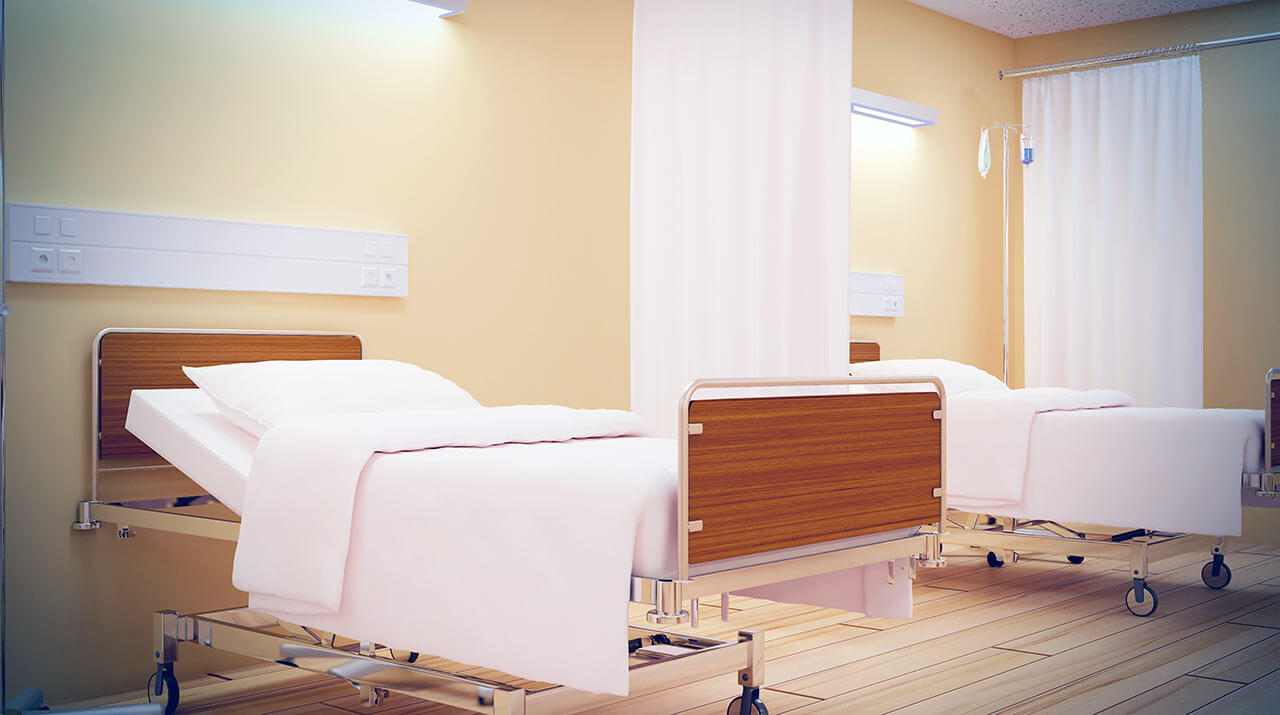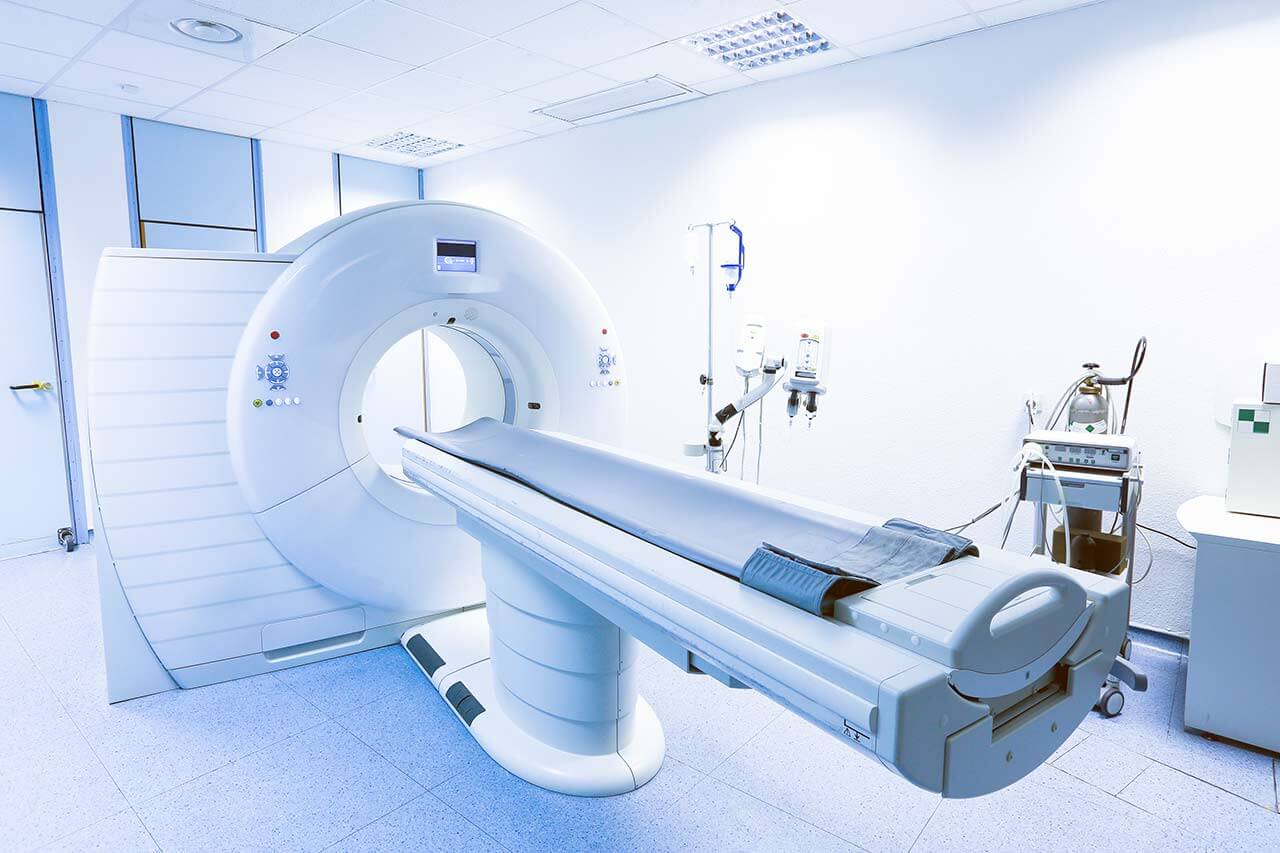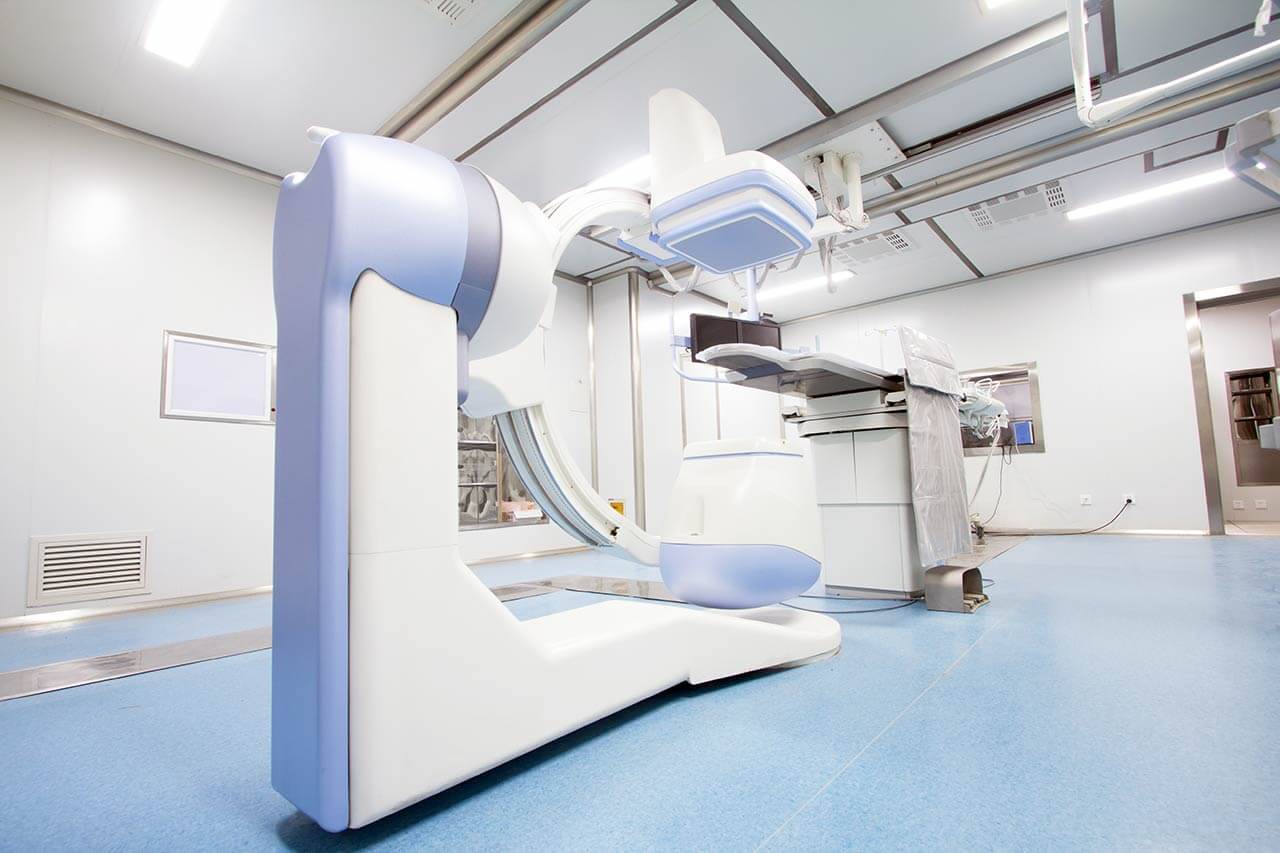
The program includes:
- Initial presentation in the clinic
- clinical history taking
- review of medical records
- physical examination
- laboratory tests:
- complete blood count
- general urine analysis
- biochemical analysis of blood
- inflammation indicators (CRP, ESR)
- TSH-basal, fT3, fT4
- indicators blood coagulation
- CT planning of radiation therapy
- a full course of conventional radiation therapy
- symptomatic treatment
- control examinations
- nursing services
- consultation of related specialists
How program is carried out
During the first visit, the doctor will conduct a clinical examination and go through the results of previous laboratory tests and instrumental examinations. After that, you will undergo an additional examination, including complete blood count, laboratory assessment of liver and kidney function. Based on the received results, the physician will conduct radiotherapy planning with the help of CT or MRI, make the permanent tattoo marks on the skin and conduct CT simulation in order to assess the accuracy of the rays and the radiation dose. If necessary, related medical specialists will be involved in the elaboration of a treatment regimen (tumor board).
Radiation therapy is carried out as the day hospital procedure, without mandatory admission to the hospital. At each visit, the physician will assess your general condition and the marks on the skin. After that, you will be placed in a shielded radiation therapy room, on a special table.
Each radiation therapy session lasts less than half an hour (including preparation). All this time, doctors and nurses are monitoring your condition, you can communicate with them through a loudspeaker. The procedure is completely painless. Depending on the planned course of treatment, you will visit the hospital from 1 to 3-5 times a week.
After the completion of the radiation therapy course, you will undergo control examinations aimed at assessing your condition and efficacy of treatment. After that you will receive the medical report with detailed recommendations regarding further follow-up and treatment. In the future, you will be able to have a distant consultation with your attending physician and schedule the next course of treatment, if necessary.
Required documents
- Medical records
- MRI/CT scan (not older than 3 months)
- Biopsy results (if available)
Service
You may also book:
 BookingHealth Price from:
BookingHealth Price from:
About the department
The Department of Radiation Therapy at the University Hospital Greifswald offers the full range of modern methods of radiation therapy for patients with benign and malignant diseases. Particular attention is paid to radiation therapy for cancer of various localizations. In most cases, irradiation takes place on an outpatient basis. The department is proud of its state-of-the-art technical base, which includes two linear accelerators, ELEKTA Versa HD and ELEKTA Synergy, with digital imaging, the Siemens Definition AS CT scanner, the Philips Pinnacle 3D treatment planning system, the MOSAIQ monitoring system, the Varian Gammamed 12ix device for afterloading therapy, stereotaxic Brainlab equipment, and many other innovative devices that allow doctors to perform efficient irradiation. The images are uploaded to the picture archiving and communication system so that specialists from different departments can quickly access patient data. The department's radiation therapists accurately plan each radiation procedure in order to achieve the most effective result. The department uses the very latest types of radiation therapy, which allow the doctors to maximally affect the target area with virtually no harm to healthy adjacent organs and anatomical structures. The Head Physician of the department is Dr. med. Elke Asse.
External beam radiation therapy is most often performed in the department. During the procedure, an external device directs high-energy beams to a pathological focus in the body. External beam radiation therapy includes 3D conformal radiation therapy, intensity-modulated radiation therapy, image-guided radiation therapy, and stereotactic radiation therapy. Each of the above-mentioned irradiation techniques has the highest accuracy, which allows doctors to deliver a high dose of radiation directly to the oncological focus while healthy tissues are not affected. The specialists thus achieve excellent therapeutic results with minimal side effects.
The department's team of doctors has rich clinical experience in stereotactic radiation therapy for brain tumors. The main difference of this therapy lies in the single application of a precisely targeted high dose of radiation. Stereotactic radiation therapy is highly effective and practically does not affect healthy tissues, due to which the risk of side effects is negligible. High-precision targeting of radiation to a malignant tumor in the brain is carried out under CT or MRI imaging guidance. Such treatment is usually indicated for patients with hard-to-reach malignant brain tumors or for patients with contraindications to classical surgery.
The department's specialists also successfully carry out brachytherapy (internal radiation therapy). This type of radiation therapy provides patients with high accuracy and allows doctors to deliver a radiation source directly to the tumor. Brachytherapy ensures a targeted effect on the neoplasm without any adverse effect on adjacent healthy structures, and therefore such an approach has a significant advantage over other radiation therapy methods. The department most often uses the following types of brachytherapy: intravaginal, intrauterine, and intraluminal. Depending on the aggressiveness of the neoplasm, the department's specialists may prescribe low-dose or high-dose internal radiation therapy to the patient. Brachytherapy is regularly used for uterine, cervical, vaginal, prostate, and esophageal cancers, as well as soft tissue sarcomas. Internal radiation therapy takes about 1-2 hours and is performed under general or local anesthesia. Brachytherapy is highly effective and well tolerated, including by elderly people with comorbidities. At the same time, the procedure practically does not cause any severe side effects, and a patient can return home on the day of the procedure.
The department's doctors also specialize in radiation therapy for benign diseases: degenerative changes in muscles at the sites of their attachment to the bone, heel spurs, Achilles tendon inflammation, arthrosis, and other pathologies. Radiation therapy for the above-mentioned benign diseases can effectively eliminate pain. As a rule, the procedure is carried out several times a week and lasts about 30 seconds. This is completely painless. Side effects are quite rare due to the use of low doses of radiation, which is a significant advantage for patients.
The department's main clinical activities include:
- Radiation therapy for malignant diseases
- External beam radiation therapy
- 3D conformal radiation therapy
- Intensity-modulated radiation therapy
- Image-guided radiation therapy
- Volumetric modulated arc therapy
- Stereotactic radiotherapy
- Total body irradiation
- Afterloading technique
- Internal radiation therapy
- Brachytherapy: intravaginal, intrauterine, and intraluminal
- Radiochemotherapy for tumors of various localizations: esophageal, lung, rectal, ENT cancers, etc.
- External beam radiation therapy
- Radiation therapy for benign diseases: heel spurs, Achilles tendon inflammation, arthrosis, etc.
- Other types of radiation therapy
About hospital
According to the reputable Focus magazine, the University Hospital Greifswald is included in the ranking of the best medical complexes throughout Germany!
The hospital is one of the oldest healthcare facilities in Germany, with long traditions and an excellent reputation. The history of the hospital begins in 1456, when the Faculty of Medicine at the University of Greifswald was founded. During this time, the hospital has managed to earn recognition in the national medical arena and gain prestige abroad. The hospital has 19 institutes and 21 specialized departments. The key to successful clinical practice is the combination of state-of-the-art equipment and highly qualified medical personnel who are actively engaged in the development of effective medical techniques and implement them in everyday practice.
The medical team of the university hospital has more than 4,400 employees, including world-famous professors who regularly undergo advanced training in the leading European and American hospitals, where they share their experience with foreign specialists. The doctors at the medical facility annually treat about 180,000 patients. At the same time, the specialists often provide medical care to patients with complex clinical cases, even in those cases that doctors at other medical centers consider hopeless. The hospital has more than 1,000 beds for inpatients, and many highly-specialized outpatient clinics are available in the medical facility for counseling and outpatient medical care.
The hospital presents all the fields of modern medicine. According to Focus magazine, the medical complex is recognized as one of the best in Germany for treating bowel cancer, bladder cancer, malignant brain tumors, skin cancer, multiple sclerosis, Parkinson's disease, dementia, cardiovascular pathologies, knee and hip pathologies, as well as ophthalmic and proctologic diseases. Diagnostic and therapeutic procedures are carried out in strict accordance with national and international standards, which ensures top-class medical care.
The medical team at the hospital makes sure that each patient feels as comfortable as possible during the therapeutic process. Doctors and nursing staff show humanity and understanding, striving to support each patient in every possible way on the path to recovery.
Photo: (с) depositphotos
Accommodation in hospital
Patients rooms
The patients of the University Hospital Greifswald live in comfortable single and double rooms. The patient rooms are made in bright colors and are quite cozy. The furnishings of a standard patient room include an automatically adjustable bed, a bedside table, a TV, and a telephone. The patient room has a table and chairs for receiving visitors. There is also free Wi-Fi in the patient rooms.
If desired, patients can live in enhanced-comfort rooms. In such rooms, patients are additionally offered toiletries, a bathrobe, and a change of towels.
Meals and Menus
The patients of the hospital are offered three healthy and tasty meals a day: a buffet breakfast, a hearty lunch, and dinner. The hospital also houses a cafeteria where one can have a tasty snack, a cup of aromatic coffee, tea, or soft drinks.
Patients staying in enhanced-comfort rooms are offered a special menu with a wide range of main courses, appetizers, desserts, and drinks.
Further details
Standard rooms include:
Religion
The services of representatives of religions are available upon request.
Accompanying person
Your accompanying person may stay with you in your patient room or at the hotel of your choice during the inpatient program.
Hotel
You may stay at the hotel of your choice during the outpatient program. Our managers will support you for selecting the best option.




